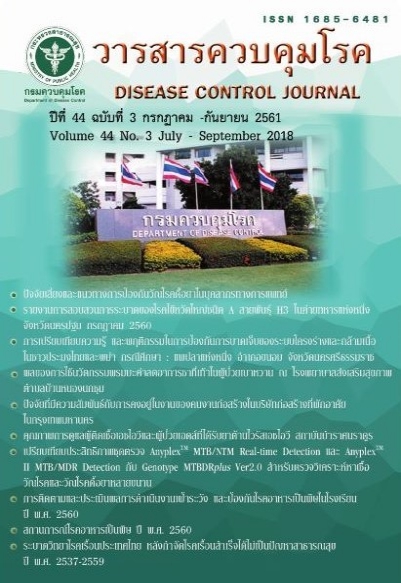Situation of food poisoning, 2017
DOI:
https://doi.org/10.14456/dcj.2018.29Keywords:
food poisoning, 5 dimension investigation systemAbstract
The surveillance system that operated by the Bureau of Epidemiology, Department of Disease Control, Ministry of Public Health, Thailand has shown food poisoning is among the top 10 disease burden in Thailand. The incidence of disease has been increasing. The author used the 5 dimensions to analysis that include the determinant, behavior, morbidity and mortality, event-based and program response by using the data from the routine national infectious diseases report (R506 report), Outbreak Verification Database and the performance profile of the Food and Waterborne Disease Program of the Bureau of Epidemiology. Data were obtained from 506 report and outbreak investigation and analyzed by the Microsoft® Excel, version 2016 and presented by frequency and percentage. The incidences of disease between 2017 and 2016 were not different and had trend on January, July and December. The determinants of disease were Vibrio parahaemolyticus and Salmonella spp. Risk factors were the food menu (chicken rice, food or dessert with coconut milk and fried rice) and left-over food. Risk age-group were 7 to 24 years old and the risk setting was school. Food poisoning is a disease problem in Thailand. These risk factors were the process of cook and the behavior of customers. If the disease control-program-involved staff need reducing the outbreaks of the food poisoning, they should focus on school and general population disease prevention and managing the process of cooking and customers ’ behaviors.
Downloads
References
2. สำนักสุขาภิบาลอาหารและน้ำ. ผลการสำรวจพฤติกรรมการบริโภคอาหารและน้ำ ปี พ.ศ. 2553 [อินเทอร์เน็ต]. [สืบค้นเมื่อ 24 ม.ค. 2561]. แหล่งข้อมูล: http://foodsan.anamai.moph.go.th/download/D_Abstract/2559/งานวิจัย_พฤติกรรมการบริโภคอาหาร.pdf
3. สำนักสุขาภิบาลอาหารและน้ำ. สถานการณ์คุณภาพน้ำบริโภคในประเทศไทย ปี พ.ศ. 2551-2559 [อินเทอร์เน็ต]. [สืบค้นเมื่อ 24 ม.ค. 2561]. แหล่งข้อมูล: https://www.m-society.go.th/article_attach/21561/21296.pdf
4. สำนักงานสถิติแห่งชาติ. ผลการสำรวจพฤติกรรมการบริโภคอาหารของประชากร พ.ศ. 2560 [อินเทอร์เน็ต]. [สืบค้นเมื่อ 28 พ.ค. 2561]. แหล่งข้อมูล: https://www.m-society.go.th/article_attach/22149/21514.pdf
5. สำนักระบาดวิทยา. รายงานสอบสวนโรคจากเวรตระหนักรู้. นนทบุรี: สำนักระบาดวิทยา กรมควบคุมโรค; 2560.
6. กองสุขศึกษา. สรุปสถานการณ์พฤติกรรมเสี่ยงด้านสุขภาพ (การบริโภคอาหาร ออกกำลังกาย อารมณ์ สุขอนามัยส่วนบุคคล และอุบัติเหตุ) ของเด็กวัยเรียน พ.ศ. 2559 [อินเทอร์เน็ต]. [สืบค้นเมื่อ 10 ม.ค. 2561]. แหล่งข้อมูล: http://164.115.22.119/index.php?goto=news&action=SHOW&news_id=16
7. สำนักสุขาภิบาลอาหารและน้ำ. รายงานผลการดำเนินงานตลาดสดน่าซื้อสำนักงานสุขาภิบาลอาหารและน้ำ ปี พ.ศ. 2558 [อินเทอร์เน็ต]. [สืบค้นเมื่อ 24 ม.ค. 2561]. แหล่งข้อมูล: http://foodsan.anamai.moph.go.th/main.php?filename=food_index18#h7
8. ชนัดดา ตั้งวงศ์จุลเนียม. สรุปผลการติดตาม และประเมินผลการดำเนินงานเฝ้าระวังและป้องกันโรคอาหารเป็นพิษในโรงเรียน ปี พ.ศ. 2560. นนทบุรี: กรมควบคุมโรค; 2560.
9. สำนักสุขาภิบาลอาหารและน้ำ. การประเมินสถานการณ์สุขาภิบาลอาหารในสถานประกอบการด้านอาหาร [อินเทอร์เน็ต]. [สืบค้นเมื่อ 24 ม.ค. 2561]. แหล่งข้อมูล: http://foodsan.anamai.moph.go.th/download/D_Abstract/2559/งานวิจัย_ประเมินสถานการณ์สุขาภิบาลอาหารฯ.pdf
10. กองสุขาภิบาล. รายงานประจำปีโครงการกรุงเทพฯ เมืองอาหารปลอดภัย ปีงบประมาณ พ.ศ. 2558 [อินเทอร์เน็ต]. [สืบค้นเมื่อ 21 พ.ย. 2560]. แหล่งข้อมูล: https://www.m-society.go.th/article_attach/16805/19501.pdf
Downloads
Published
How to Cite
Issue
Section
License
Articles published in the Disease Control Journal are considered as academic work, research or analysis of the personal opinion of the authors, not the opinion of the Thailand Department of Disease Control or editorial team. The authors must be responsible for their articles.






